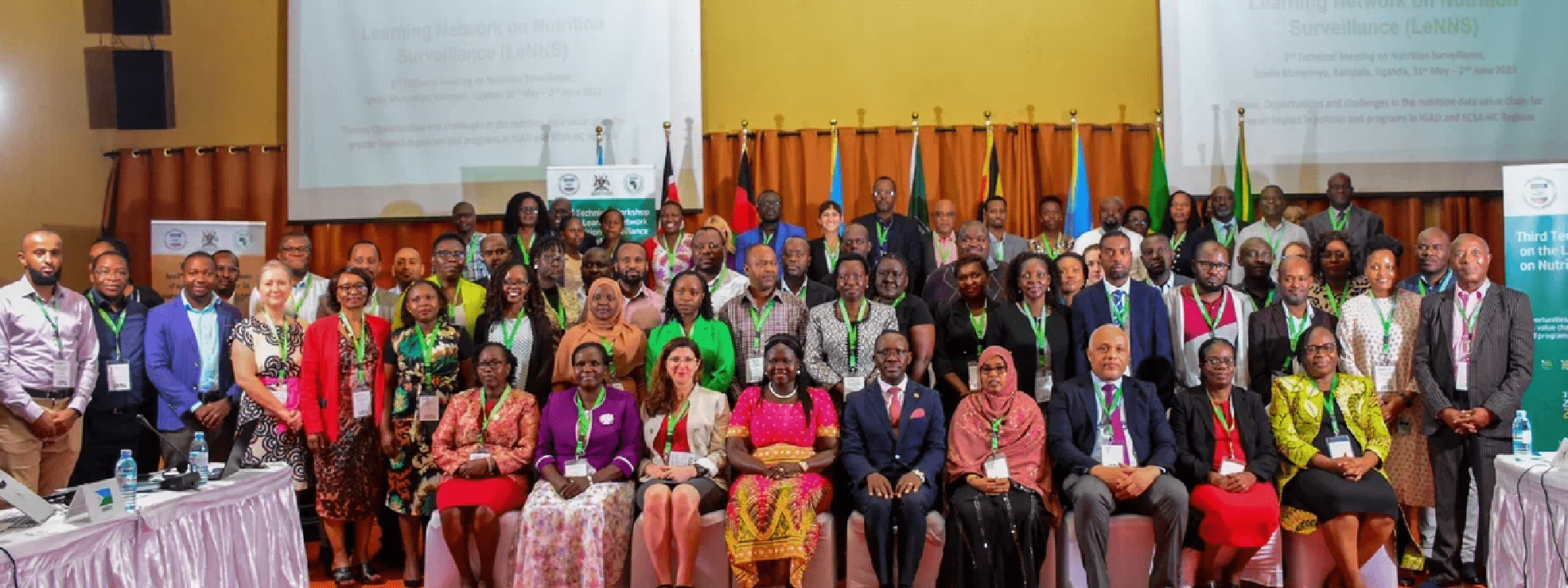May 31, 2023 (Kampala, Uganda): Today, the Intergovernmental Authority on Development (IGAD), East, Central and Southern Africa – Health Community (ECSA-HC), and Ministry of Health Uganda commenced a 3-day meeting in Kampala at Speke Munyonyo. The theme of the nutrition surveillance meeting is “Opportunities and challenges in the nutrition data value chain for greater impact in policies and programs in IGAD and ECSA-HC Regions.” Participants will discuss how to address the bottlenecks of collecting, analyzing, and using data for decision-making in their countries. This meeting brings together government nutrition experts, universities, and research institutions in food and nutrition data from across the globe and is convened by the Learning Network on Nutrition Surveillance (LeNNS) initiative which is hosted by the IGAD Centre of Excellence on Nutrition (ICEN). LeNNS has membership from Djibouti, Malawi, Zambia, Tanzania, Rwanda, Kenya, Somalia, and Uganda. Also represented in this meeting are World Health Organization (WHO), UNICEF-East and Southern Africa Regional Office (ESARO), US Center for Disease Control (CDC), among other development partners. This initiative is funded by United States Agency for International Development (USAID).
The 3-day meeting was officially opened by Dr. Daniel Kyabayinze, Director of Health Services in Charge of Public Health, other representatives of the Ministry of Health, Uganda; Ambassador Lucy Daxbacher representing H.E Dr. Workneh Gebeyehu, IGAD Executive Secretary; ECSA-HC, USAID, and WHO.
“The collaboration between IGAD and ECSA-HC is within the African Union strategy of inter-REC coordination and collective continental efforts. As a developmental inter-governmental organization, IGAD recognizes the need for generation and use of data both for emergency response and the development agenda,” remarked Ambassador Lucy Daxbacher, IGAD Head of Mission, Uganda.
Participants at the meeting shared and learned about innovative systems, methods, and tools that can be used for analyzing nutrition situations for promoting nutrition impacts in East, Central, and Southern Africa. They also deliberated on how the innovations from out of the region can be adopted and adapted in IGAD and ECSA regions considering the prevailing contexts. These contexts include country and regional surveillance systems, human capacity, and resource availability.
“The re-occurring food and nutrition security challenges in drought-stricken areas in Uganda and neighboring countries are increasingly eroding the gains made as more and more infants, young children, and their mothers become malnourished. I hope that this network will lead to the strengthening of nutrition surveillance in the region through sharing of lessons and best practices and lead to better responses to the food and nutrition situation’’ noted Dr. Daniel Kyabayinze.
“I want to acknowledge various partners for supporting this initiative. Let me thank USAID, WHO, ECSA-HC, and UNICEF for providing IGAD and its member states with financial and technical support to implement this initiative,” said Dr. Kyabayinze.
Participants were not only ready to continue exchanging information but also to work together to address the common concern in ways in which food and nutrition data is collected, analyzed, disseminated, and used. LeNNS’s ultimate goal is to lead to effective nutrition policy formulation, advocacy, and action planning through the provision of timely data, information, and evidence.

